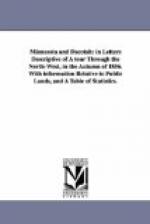was more than a hundred miles off in another direction.
Lewis and Clarke had ascended the river previously.
In 1820, General Cass, accompanied by Mr. Schoolcraft,
explored the river to Cass Lake; being obliged to
stop there on account of the low stage of water which
they heard existed a few days’ journey beyond.
Again, in 1832, Mr. Schoolcraft, then superintendent
of Indian affairs, made another expedition, which
resulted in his discovery of the true sources of the
river; it being a lake which he named Itasca.
It has been said that he manufactured this beautiful
word out of the last syllables of veritas and the
first syllable of caput (the true head). But I
have been told that the word was suggested to his
mind by an Indian word signifying breast. Dr.
Johnson says, that a traveller in order to bring back
knowledge should take knowledge with him. That
is, that he should have posted himself up to some
extent on the country he visits. I hope it will
not require an affidavit for me to prove that I availed
myself of the suggestion. But I must say I have
found great pleasure and profit in perusing Mr. Schoolcraft’s
narratives of both his expeditions. Though he
had the encouragement of the government, his undertaking
was surrounded by many obstacles and some dangers.
His account of the whole country is pleasant and instructive
to the reader, and shows that all he saw produced
on his mind a favorable impression. The arduous
services of this gentleman as an explorer have been
of great advantage to the country, and his fine literary
talents have given his adventures an historic fame.
Not less deserving of applause either have been his
efforts to promote the welfare of the Indians.
He now lives in affluent circumstances at Washington,
and, though suffering under some bodily infirmities,
appears (or did when I saw him) to enjoy life with
that serene and rational happiness which springs from
useful employment, and a consciousness that past opportunities
have been improved.
“For he lives twice who can at once
employ
The present well and e’en
the past enjoy.”
There have been other explorations of this part of the country at different times by Messrs. Long, Nicollet, and Pope. M. Nicollet was accompanied and assisted by Mr. (then Lieutenant) Fremont. The reports made of these explorations afford information which, if extensively known among the people, would tend to direct a larger emigration into the upper part of the territory. They often launch off into exclamations as to the beautiful surface of the country; while their account of native fruits and the bracing climate and fertile soil picture to the imagination all the elements of a home.




